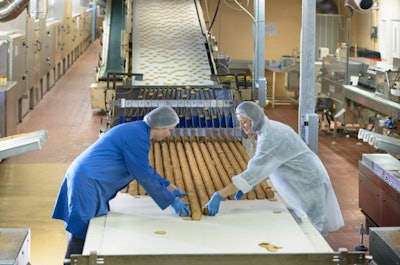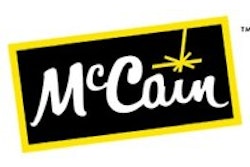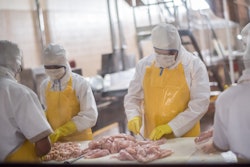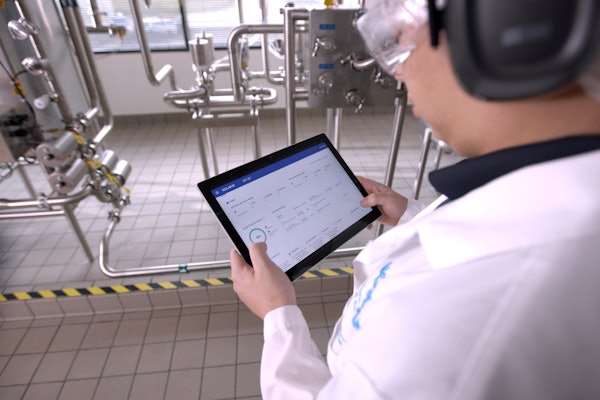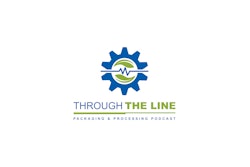Successful Strategies To Enter The German Packaging Machinery Market, a report compiled by Euromonitor International for PMMI Business Intelligence, was created in preparation for German trade show Interpack to learn about perceptions of North American machineries and services, and to assist with export goals. While Interpack has been cancelled this year due to the coronavirus pandemic, the data in the report may still largely reflect the trends present in the German food and beverage manufacturing industry.
With 6,119 companies and 608,553 employees, the food industry is the fourth largest industry in Germany, and consists of over 90% small and medium-sized companies. The food industry is the main purchaser of packaging machines with a share of around 40%, and supplies over 80 million citizens with a wide range of 170,000 items. Producers with the highest sales include meat and meat products, milk and milk products, baked goods, confectionery, and alcoholic beverages.
Packaging machineries in Germany trend towards digitization, sustainability and flexibility, and the market is widely developing in response to consumer, regulatory, and sustainability demands.
There are both barriers and opportunities to enter the German procurement process. Barriers include distance; the perception German suppliers and manufacturers have of American machinery; the vetting process; and, the tendency of German manufacturers to stay with a limited number of suppliers.
Distance: Manufacturers in Germany are in constant communication with suppliers, year round. Penetrating the market will require quick response time, familiarity and ultimately local ties.
“Dull” American machinery perceptions: German suppliers and manufacturers have a tendency to perceive American machinery as lacking creativity and ability to conform to European standards.
Established network of suppliers: Large German F&B manufacturers tend to have a set list of approved vendors – the vetting process to become an approved vendor can take time and resources.
Manufacturers stay with as few suppliers as possible: Manufacturers tend to stick with as few suppliers/integrators as possible to maintain full integration of their systems and concentrate responsibility of packaging.
Opportunities include the ability to establish a local presence; the ability to offer customized solutions; and, the ability to demonstrate a machine’s integration capabilities.
Establish a local presence: International suppliers are more susceptible to being seen as slow to respond due to distance, but regular engagement, quick response times and/or local memberships and partnerships can reduce the distant feel.
Offer novel/customized solutions based on manufacturer needs: The need for novelty/custom machinery can often be a challenge with German F&B manufacturers sourcing from the same pool of suppliers. Challenge manufacturer perceptions of American machineries with Industry 4.0 and sustainability solutions. According to the report, Germany’s Industry 4.0 is widely adopting, but faces challenges with skilled labor, policies and infrastructure.
Demonstrate integration: when demoing, highlight the solution’s capabilities beyond itself: also point out how it conforms to German regulatory standards, consumer needs, machines and processes.
Report respondents offered the follow advice:
“For any American supplier of filling / packaging equipment: Present your capabilities to the integrators and if you have something new / unique, find ways to inform associations, or even better, with German speaking commercial staff in Germany. We can always be approached and are always interested.” -German F&B Manufacturer
“Understand customer process, their bottlenecks and come up with creative solutions. The trend is clear: less selling what exists and more selling what the customer needs. The degree of customization is increasing considerably in the last years.” -German F&B Packaging Supplier
“North American machinery has to have presence on German market for service, either own sales organization or through an agent. Acquiring partners is only viable for the larger manufacturers, otherwise it can be expensive. Entering new markets/gaining access to newcustomers from NA-manufacturer, would be a possibility. A lot of F&B manufacturers already have their vetted lists. So maybe, by being on the vetted list in North America, would make it possible to enter the European market for the F&B manufacturer subsidiaries in Germany.” -German F&B Packaging Supplier
And finally, taking into account German styles of communication and general business practices will enhance an effective entry into the market. Said one German F&B Manufacturer, “Be warned: The German style of selling and buying is entirely different from US style. Americans will not like this style. German engineers are very fact-driven. Precise. Overly correct. Never, ever lie. Not even for 0.5%. And building rapport and have a good relationship is not by having a nice time together or having a beer. Laughing is considered suspicious. During meetings, people communicate in a very dry matter. Can look at spreadsheets and drawings. No humor at all. And for a German engineer: Design, think, design, ... do it again, find the mistakes, avoid a future mistake with all means... and then start to build something. Trial and error is not a German invention at all. But ... loyal to the bone. Overly correct. Cautious. Precise. You may start to like them…”
For a free download of the executive summary of this report, click here. PMMI members can download the entire report for free.
Source: PMMI Business Intelligence, Successful Strategies To Enter The German Packaging Machinery Market
